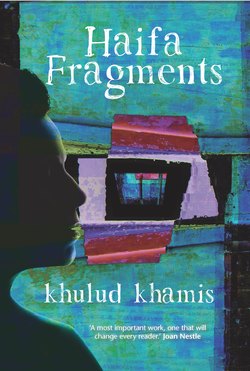Читать книгу Haifa Fragments - khulud khamis - Страница 8
На сайте Литреса книга снята с продажи.
ОглавлениеWhen Maisoon was 16, her grandmother called her into the salu.1 Shifting her ample frame on the old sofa she made room for her granddaughter. She cupped Maisoon’s face in her hands and her granddaughter’s dark hair fell over her arms. “Maisoon, I want to tell you the story of your name.” She patted Maisoon on the knee and didn’t stop until she had finished.
“It was 1948, Haifa’s last battle. I was eight months pregnant. Seedo was away with the rest of the young men. I don’t know what he did exactly, because he refused to carry a weapon. The Yahud lived up the mountain, and we were down here. The night the first barrels were rolled down from Share’a El-Jabal … I remember that night. I was alone at the house with your father Majid. I heard screaming outside, and I saw our neighbour Haneen running out—and up and up the mountain.
“She had six small children in the house. Her husband had been among the first ones to be killed, and she lost her mind. Haneen the majnouny we called her. She would wail for hours every night. It was like the sound of an animal. I don’t think she ever slept. Someone from the church had come and tried to take her children. Ya rab! I never saw a mother fight like Haneen for her children. Haneen’s whole world was her family … On that night, she wanted to stop the barrels with her bare body. When I saw her running, I didn’t think. I took little Majid in my arms and ran after her, but Haneen was fast and I was pregnant. Or maybe I should have left Majid at home but I couldn’t … how could I? …
“That night a woman from the church came and took all of Haneen’s children. And that night I lay down on the kitchen floor and bled. I bled and I looked up and I saw through the window that the sky was red. There were sparks flying, I thought is there a celebration, someone getting married? How could they at this time … or is the sky bleeding Haneen’s death. I didn’t understand. I thought I must be losing too much blood to see the sky sparkling like that.
“Seedo came back in the morning. I thought his clothes had my blood on them but it was not my blood. I asked Abu Majid what happened and he only looked at me and my bloody clothes and lay down next to me and we wept. The next morning the woman from the church came back and told us there was a ship taking refugees to Lubnan and we could go with Haneen’s six children. Your grandfather told her to go away: we had already lost one and we would not leave our home. I held on to little Majid so tight that he started screaming. Seedo buried the little one in the garden. I couldn’t bear leaving her there all alone so we couldn’t go away because of her.
“When Majid was 15 I told him about that night and he asked me if she had a name. I told him I named her Maisoon. He gave her back to me when you were born but he made me promise never to tell you so you don’t carry her history, his history, our history in your name … But I don’t have the right to take this with me to the grave. Majid will understand one day.”
1 A Glossary appears on pp 169–173.
